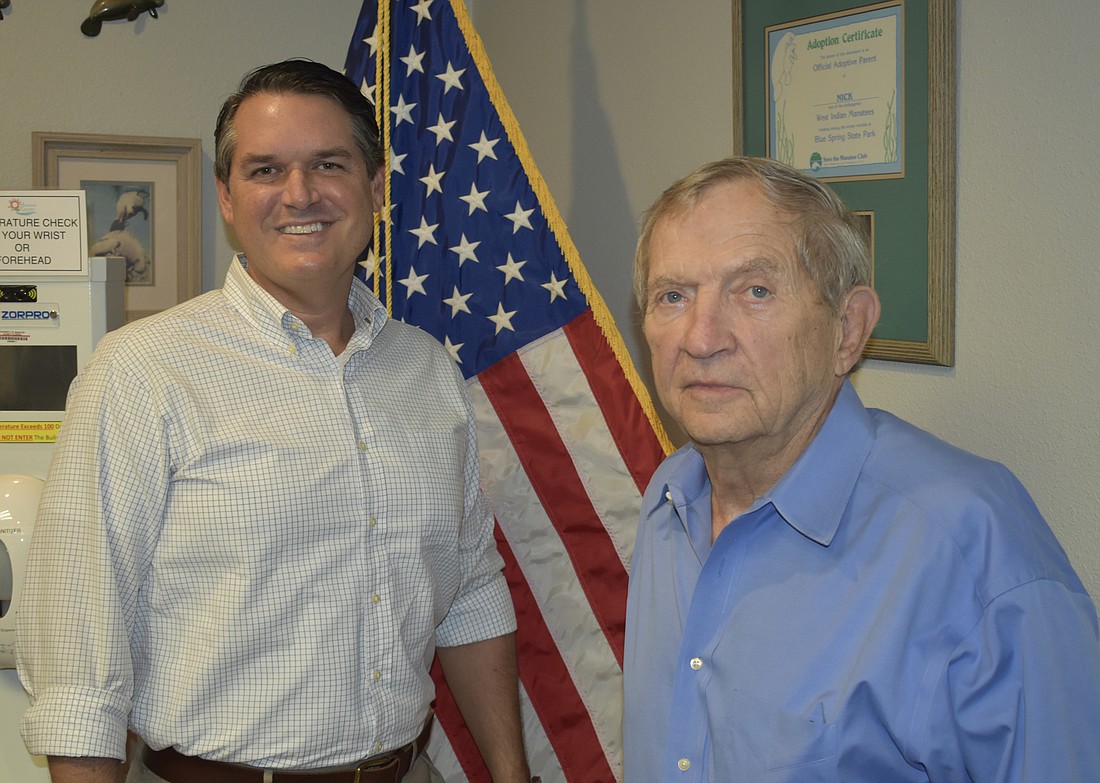- April 4, 2025
-
-
Loading

In a visit to Bradenton Oct. 5, Cord Byrd, Florida's secretary of state, said Hurricane Ian will have an impact on the Nov. 8 General Election.
Byrd said he will visit supervisor of elections in all 67 counties to discuss the matter. Byrd met with Michael Bennett, Manatee County's supervisor of elections, in Bradenton.
Byrd said he is assessing whether or how the state could implement orders that would loosen certain voting restrictions to benefit victims of the hurricane.
“My goal, the state's goal, is that every single voter who wants to vote has that opportunity,” he said. “We're going to make sure that we have the means and resources in place to make that happen.”
Bennett said Manatee County is assessing the current situation but has received few phone calls from residents concerned about their ability to vote.
However, Bennett also said in conjunction with the state, work is underway on a plan that would allow residents who have evacuated the area due to the storm, to receive vote-by-mail ballots at a different address than the one under which they are registered to vote.
Bennett said his office is still waiting to hear from the state government on whether this measure could be implemented.
If citizens have had a ballot already mailed to the address where they live that was damaged by the storm, or that they evacuated, currently there is no way it can legally be forwarded to a new address, or that a second ballot can be sent.
Byrd said if a home or other location has lost its mailbox, the ballot will return to the Post Office for up to 10 days, where the voter can pick it up. After that, it is sent to the Supervisor of Elections office, which will make an effort to contact the voter.
Bennett said there are potential problems with access to voting sites in the Myakka City area due to flooding. With a month before the election, Bennett said his office will reevaluate the situation closer to the General Election. If additional polling centers needed to be set up, it would be done at the discretion of the election supervisors of individual counties.
“They know their counties best, and where their population centers are, and how far it is for any one resident to drive to go to the polls,” Byrd said.
However, he said the supervisor’s actions would also be subject to review by the state.
He said he would be open to extensions of early voting, with election centers staying open from the start of early voting until election day, as has already been scheduled in Lee and Bay counties.
Byrd said residents can either vote by mail, or vote early or on election day, and said he is working to ensure the state can perform the loosening of restrictions within as narrow a range as possible.
Among restrictions signed into law by Governor Ron DeSantis is a two-ballot limit on ballots delivered on behalf of another person, outside of one’s family.
Byrd said there were no plans to make exceptions to this rule.
"That's an important election security measure,” he said.
This activity has been termed “ballot harvesting” by critics, who argue it makes discarding of ballots possible, while others have pointed to the rarity of such occurrences and the difficulty in voting its absence could pose to the elderly or disabled.
Among other examples of recent restrictions are requirements that voters request mail-in ballots once every two years instead of every four years, and restrictions on the ability to provide food or water to those waiting in line to vote.
Byrd said the state was “absolutely not” considering postponing elections.
“I can't see any reason why we wouldn't be able to do this, and that's after visiting the counties that were hardest hit,” he said.
“The supervisors are very resilient,” he said. “They're a great group. They don’t complain, they just pull up their bootstraps and say, we're going to have an election, and get it done.”
He said a day earlier he had spoken to Tommy Doyle, the supervisor of elections in Lee County.
“He said they're in rough shape, but they seem to be moving forward,” he said.
Bennett said he was confident in the Myakka City area to be ready to vote as well.
“Those people are survivors,” Bennett said. “They know how to make things happen.”
In creating emergency orders, Florida has the precedent of orders given in 2018 during the aftermath of Hurricane Michael, by then-governor Rick Scott.
Those orders allowed election supervisors to designate alternative election sites, send vote-by-mail ballots to alternate addresses, and deliver a vote-by-mail ballot to an elector’s immediate family member, among other actions.
Following Hurricane Ian, Byrd has already signed an emergency order which delayed the requirement for political candidates to present a campaign finance report from Friday, Sept. 30 to Friday, Oct. 7.